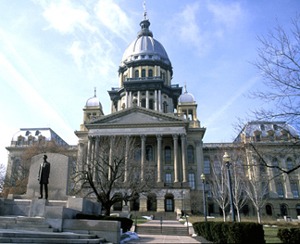 Northern Illinois University president John G. Peters and acting executive vice president and chief of operations Steven Cunningham lined up with other higher education leaders in the state to testify before the Senate Executive Committee as to the viability of legislation aimed to stabilize the State Universities Retirement System (SURS). Their combined testimony was well-received.
Northern Illinois University president John G. Peters and acting executive vice president and chief of operations Steven Cunningham lined up with other higher education leaders in the state to testify before the Senate Executive Committee as to the viability of legislation aimed to stabilize the State Universities Retirement System (SURS). Their combined testimony was well-received.
In addition to Peters and Cunningham, the group included Robert Easter, president of the University of Illinois; Southern Illinois University president Glenn Poshard; Governor’s State University president Elaine Maimon and Avijit Ghosh, senior advisor to the president of the University of Illinois. The university presidents’ testimony centered around the March, 2013 publication by the University of Illinois’ Institute for Government and Public Affairs, “Six Simple Steps: Reforming the Illinois State Universities Retirement System,” the potential framework for future comprehensive pension reform discussions in Springfield.
Peters, who noted that his testimony was his last as NIU’s president, described the meeting as “probably the most important of my career.”
“Pension reform is the public policy problem in the state of Illinois,” Peters said. “If this is solved, everything else in the State of Illinois will begin to flow.”
The six-step plan would reduce unfunded liability within the SURS system by 28 percent, from $20.2 billion to $14.6 billion, resulting in 100 percent funding by 2044. The state also would see a 47.3 percent reduction in pension contributions over the next three decades, from $76.1 billion to $40.1 billion.
The legislation would phase in the employer cost of pensions from the state to the universities at a rate of 0.5 percent per year as well as require increased employee contributions toward retirement benefits. Once retired, annuitants would receive cost-of-living adjustments tied to the rate of inflation.
A key feature of the plan is the creation of a new hybrid Defined Benefit/Defined Contribution plan for new employees, without additional cost to the state.
“Our experts that study financial interests have come to the conclusion that this is a process that will allow us to move forward,” Easter told the committee, noting that Illinois colleges and universities are currently at a competitive disadvantage in hiring and retaining top faculty and staff. “We are where we are. Our contribution is to offer a way to move forward.”
While several members of the committee expressed concern regarding the effects of universities bearing the costs of pension funding on tuition, Cunningham testified as to the immediate cost savings to the state.
Theoretically, the savings could be utilized to help the state meet its obligations to fund deferred maintenance on the buildings it owns on college campuses, which has been undertaken by universities in recent years. Under the proposal, universities would also receive more flexibility in purchasing, hiring and inventory control, which are key to minimizing the effect of the cost shift on student tuition and fees.
“The key driver in fees has been the loss of general revenues over the years,” Peters told the committee. “We really need to help get the costs down for the students.”
Senate President John Cullerton called the proposal “very intriguing,” noting that the legislation would reduce costs while offering retirees an additional enhancement.
“I’m sure it’s something we will look at to see how it fits in with the other systems,” Cullerton added.
A representative of the We are One labor coalition called the six-step solution “a serious proposal” and noted the coalition would take time to review it.
“It’s well worth the time to give it due consideration,” replied Senator Don Harmon, chair of the committee.
The House and Senate are expected to take procedural votes during the special session Governor Pat Quinn called for Wednesday. Illinois is expected to turn to a rarely used legislative conference committee in hopes of reaching a compromise solution, Governor Quinn’s office said on Tuesday. Wednesday’s session will set up the committee structure, which is expected to be composed of a bi-partisan panel of 10 lawmakers charged with working on a pension reform bill.
Another special session is expected to be called by Governor Quinn in early July. NIU administrators will continue to have input in the process, along with leaders of other state universities.
